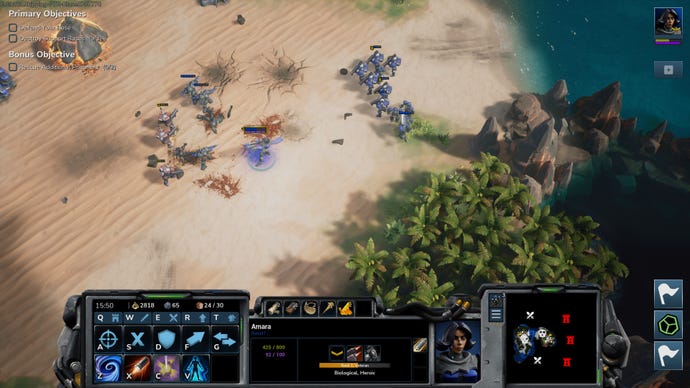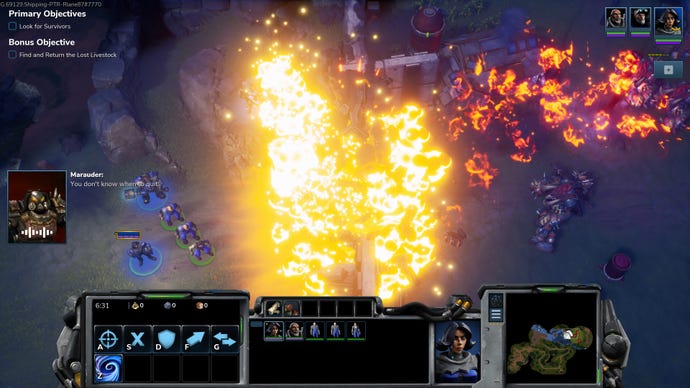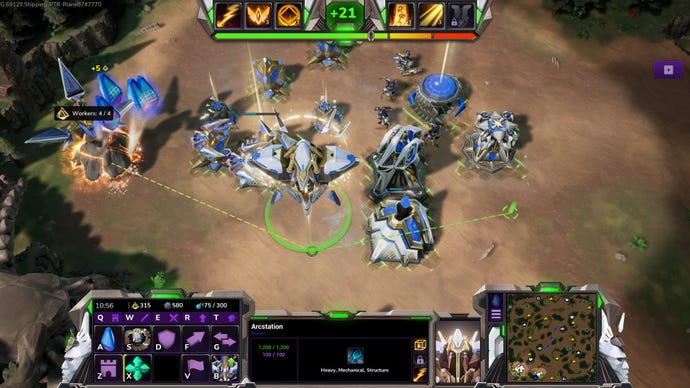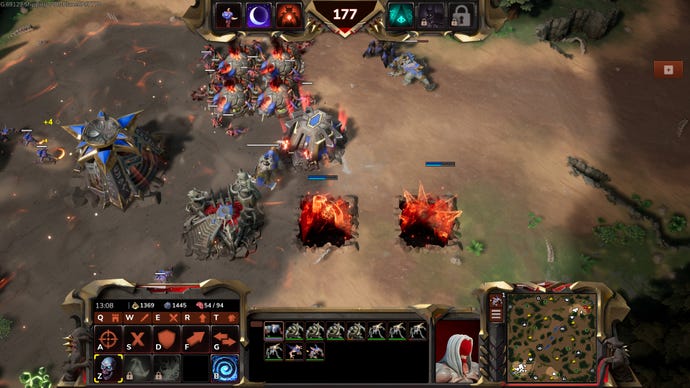Products You May Like
Stormgate is a confusing proposition. It’s an RTS directed by former Blizzard developers that is almost, but not quite, entirely unlike StarCraft. It’s a free-to-play game, but has a business model that makes you feel like you’re getting a rougher deal than if you just dropped thirty notes for it outright. It’s available now in Early Access, but has already been available in a kind of gravity-defying Super Early Access for several weeks (which you had to pay to get into).
All of which has made me feel very tired, and yearn for the days when you went into a shop and bought a game in a box for a set amount of money, and the whole game was in the box and you went home and put it on your PC and played it until your mum said “Richard!” (only my mum calls me Richard) “get off that computer and go outside and get some exercise! Do you want to be dead at 35?” Well, I’m 36 now mum. Nearly 37. So who’s laughing through their heart palpitations now?

Ahem. The most confusing thing about Stormgate, however, is that there’s a potentially interesting strategy game here. Unfortunately, it puts its most boring foot forward first, with its intriguing trio of factions buried beneath a crust of focus-test approved blandness, and a campaign that has barely shown you anything good before it asks you to get your wallet out.
The basic premise of Stormgate is this: imagine if StarCraft fell in love with WarCraft, and together they gave birth to an army of baby demons that all came pouring out of… actually don’t imagine that bit. It’s a slick and snazzy RTS governed by the rule of threes, with three very different factions to play as, and three different ways to play as them.
Unfortunately, the first way is, currently, the worst way. Headlining Stormgate is a six-mission single player campaign that puts you in control of the Vanguard: Stormgate’s technologically advanced human faction, as they fight a war against the Infernals, Stormgate’s demon faction. Its story revolves a hardnosed female soldier called Amara, whose father was present during the initial Infernal invasion, as she attempts to rally the Vanguard against the machinations of an Infernal called Maloc.
The narrative is distinctly Blizzard in its approach, from the flashy opening cutscene with expensive-looking CG animation, to the cursed sword Amara obtains early in the story that definitely isn’t going to corrupt her in some way. The trouble is none of it is particularly compelling. Amara has all the charisma of a Star Wars prequel Jedi, while the demons are all pantomime villains from the Clive Barker amateur dramatics society. It should be noted that developer Frost Giant has stated that some VO and animations are placeholder, but I’m not sure that fresh vocal talent would change the fact that Amara is terrible company.

This dull wrapper contains some passable but unremarkable RTS missions. The freely available prologue has one character-focused mission that has you complete a level with a limited set of units, and two missions that involved building a base to conquer one or several enemy bases. All of which is fine, but nothing I haven’t seen in a thousand RTS’ before.
Moreover, right now, everything I like about Stormgate has a big jiggly “but” attached to it. Base construction, for example, is slick and satisfying, with pleasing animations for assembling structures. Yet once built, I find the different buildings hard to parse visually, meaning I tend to forget which structure is which. Combat is flashy but lacks heft, especially when larger units duke it out. I like the quick menu that lets you issue construction and recruitment orders, but I don’t how selecting units and confirming orders are not universally bound to either mouse button. Left click should ALWAYS select units, Frost Giant, while right click should ALWAYS issue orders, even if you’re deploying a special ability, or confirming a building construction. Anything else is heresy. I have spoken.
By the third mission, which has you build and defend a base against three demon bases, I was just about getting to grips with Stormgate, although I was yet to properly enjoy it. This is the point where Stormgate said “right, you’ve had enough freebies, bucko, time to pony up.” To play the remaining three missions of the campaign costs nine pounds. Had the previous three missions been rip-roaring entertainment, I might have been tempted. But they weren’t, so I wasn’t.

Instead, I went over to the game’s solo multiplayer and skirmish mode to have a look at the other two factions. It was here I discovered Stormgate at its most interesting. While the Vanguard may be a bit dull, the other two factions, the Infernals and the Celestials, are anything but.
Of the two, the Infernals are my favourite faction. Frost Giant has clearly thought hard about how to make them feel properly demonic. For starters, they don’t build structures, they sacrifice meat to literally raise them from hell. Each building you “construct” opens a yawning fissure in the ground from which your structure eventually rises. Likewise, you don’t really “recruit” units. Each unit type automatically generates a charges over time. Once a single charge is full, you can summon that unit instantly onto the battlefield. This means you can put together armies really quickly and rush them toward enemies for a nasty surprise.
Playing as the Infernals brings back fond memories of being a horrible little git to fantasy heroes in Dungeon Keeper. It’s a feeling that’s enhanced by the creative demon types. Even your basic demon, the Brute, has a nasty trick whereby it can sacrifice itself to split into two smaller, AI controlled demons.
The remaining faction, the Celestials, are less immediately engaging than the Infernals, but are arguably more intriguing because of how weird they are. Imagine if a bunch of Lord of the Rings elves got really into new age crystal bullshit and then started building aircraft, and you’ve got a vague idea of what the Celestials are like. Their worker units are literal blue prisms that absorb energy from resource sites, while buildings are constructed via biblically accurate angel units that morph into a selected structure on command. They’re slower to put together an army than the Infernals, with a heavy emphasis on aerial units. But if you can get those aerial units off the ground, the Celestials are very tricky to counter unless you’re adequately prepared.

I should stress that this is a very, very basic introduction to these factions. Most units have special abilities that can be activated on command, while both the Infernals and the Celestials can trigger factionwide by accruing a bespoke, tertiary resource. In the Infernals case, you amassing ritual power by killing enemies, while the Celestials harvest energy from placing certain building types. Maps also have a wide range of control points that themselves provide bonuses, encouraging you to build satellite bases alongside your main headquarters.
In short, there’s a tonne of strategic nuance to how these factions have been built, which makes it all the more of a shame that Stormgate’s mechanical diversity is obscured by the game’s painfully post-Overwatch art style. Full disclosure, I never liked this semi-stylised approach to art design to begin with, and I’m even less enthused by it now it’s been adopted by every developer making a big-budget multiplayer game that wants me to care about its characters without actually putting in any narrative groundwork. Nonetheless, I really don’t think it works in a strategy game about demonic aliens tearing through reality to grab humankind by the lungs. I want Stormgate to be grittier, grimier, weightier, more impactful, not presented with all the gravitas of a Saturday morning cartoon.
At present, Stormgate is a potentially good game that makes a poor first impression. Six missions, only three of which are playable for free, makes neither a good campaign nor a good deal, while the game’s most interesting factions are hidden away in the multiplayer, where you need to do a lot of on-the-spot learning to get the most out of them. All that said, I don’t think it’s a game anybody should write off. Behind its blandifying art style is a very tactically chewy strategy game. If you’re a fan of the genre and have friends who are likewise, there’s good fun to be had in its 1v1 multiplayer, which I should stress costs nothing to try out.
.jpg?width=1200&height=630&fit=crop&enable=upscale&auto=webp)